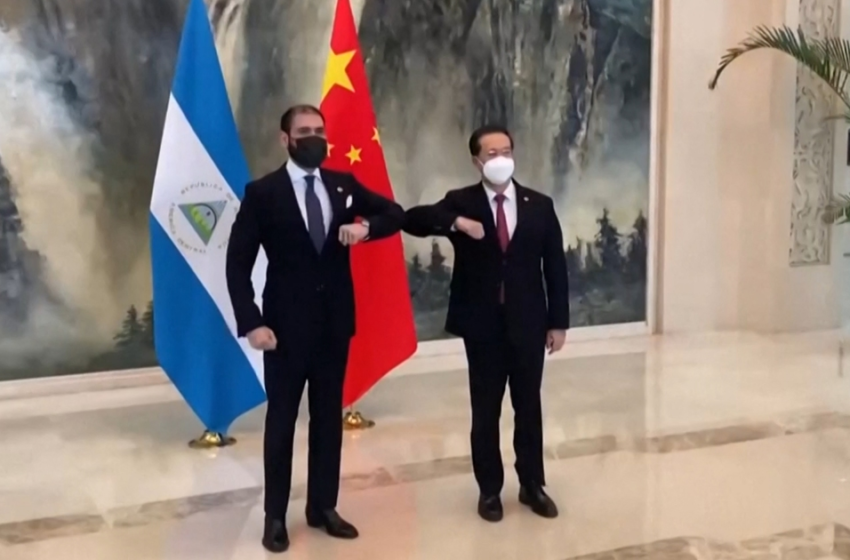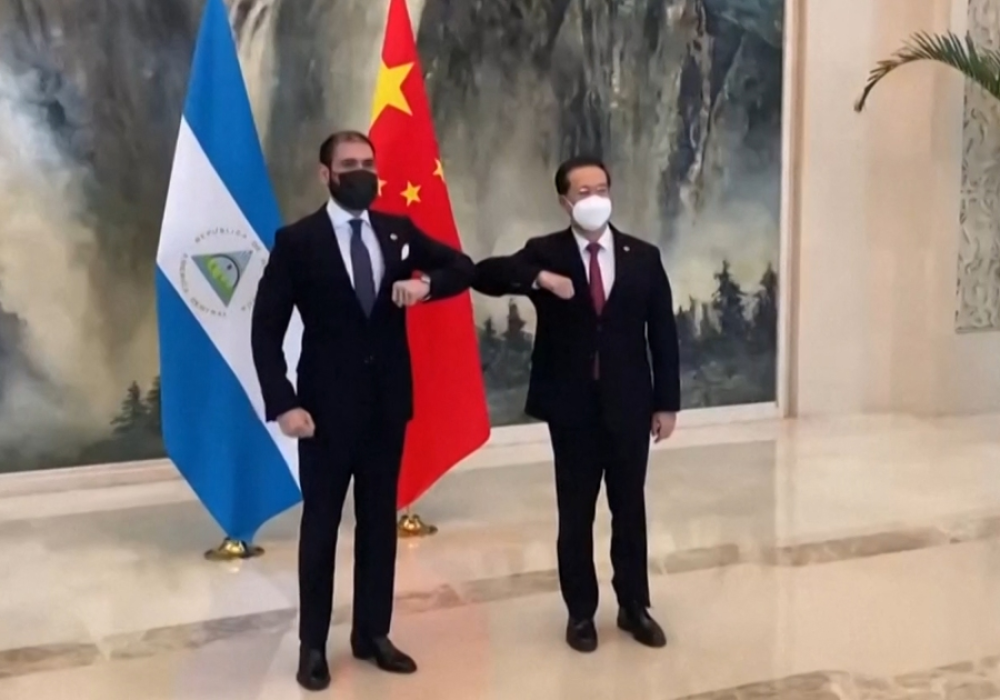Nicaragua has broken off diplomatic relations with Taiwan, leaving the self-ruled democratic island with just 14 formal diplomatic allies amid ongoing pressure from China, which claims the island as its own.
The central American country made the announcement in a brief statement on Thursday from its foreign ministry, and cited Beijing’s One China policy.
“The Government of the Republic of Nicaragua declares that it recognises that in the world there is only one single China,” the statement read. “The People’s Republic of China is the only legitimate government that represents all of China and Taiwan is an inalienable part of the Chinese territory. The Government of the Republic of Nicaragua today breaks diplomatic relations with Taiwan and ceases to have any contact or official relationship.”
Three hours after Nicaragua’s announcement, China’s State Council Information Office said the two signed a joint communique on the resumption of diplomatic ties in Tianjin.
Zhang Jun, China’s permanent representative to the UN, welcomed the move.
“We highly commend the right decision made by the Government of Nicaragua, which is in line with the prevailing trend of the times and people’s aspirations,” he tweeted, claiming Beijing’s One China principle was a “consensus widely accepted”.
In response, Taiwan’s Ministry of Foreign Affairs said that it “deeply regretted” the decision of Nicaraguan President Daniel Ortega to “disregard the friendship” of the Taiwanese people.
Taiwan also said that it was breaking off relations with Nicaragua, although the decision is widely seen as unilateral move by Nicaragua.
China and Nicaragua have resumed diplomatic relations. #GLOBALink pic.twitter.com/aW6EmBFuKo
— China Xinhua News (@XHNews) December 10, 2021
Formally known as the Republic of China, Taiwan’s government fled to the island at the end of the Chinese Civil War. It represented China at the United Nations from the end of World War II until the early 1970s.
Since the 2000s, China has steadily chipped away at Taiwan’s remaining allies who are mostly small countries in the Caribbean, South America and the Pacific Islands as well as the Holy See.
Beijing has become increasingly assertive since President Tsai Ing-wen was first elected president in 2016, with Kiribati and the Solomon Islands both breaking with Taiwan in 2019. The Solomon Islands decision remains controversial, however, and contributed to last month’s unrest in the capital Honiara, which left at least three people dead.
‘Offer they couldn’t refuse’
During the Cold War, Taiwan and Nicaragua were both united by the anti-Communist beliefs of their one-party authoritarian states, headed respectively by Chiang Kai-shek and the Somoza Family.
Both later transitioned to democracy although Nicaragua followed a more unstable path.
President Daniel Ortega has held power for 14 years and ahead of last month’s election, criticised by the United States, United Kingdom and European Union, imprisoned more than a dozen opposition leaders ahead of the vote for violating national security laws.
The US said the decision to switch ties did not reflect the will of the Nicaraguan people because of the “sham” election that took place on November 7.
“Without the mandate that comes with a free and fair election, Ortega’s actions cannot reflect the will of the Nicaraguan people, who continue to struggle for democracy and the ability to exercise their human rights and fundamental freedoms,” Price said. “We do know, however, that this deprives Nicaragua’s people of a steadfast partner in its democratic and economic growth.”
The US imposed sanctions on Ortega and his family during unrest that began in 2018 and led to the deaths of at least 325 people, according to the Inter-American Human Rights Commission.
Ortega’s government had relied on financial support from Taiwan including a $3 million donation to police in 2018, and a $100 million loan in 2019.
Other foreign aid from Taiwan, however, has taken the form of more benign school lunch projects, health care and agricultural development projects, according to Taiwan’s Ministry of Foreign Affairs.
Nicaragua was probably prompted to make the switch because “they had an offer they couldn’t refuse” from China, said Lev Nachman, a postdoctoral fellow at the Harvard Fairbanks Center. It was likely such incentives took the form of foreign aid, trade deals or other investment projects, he added.
Sana Hashmi, a visiting Fellow at the Taiwan Exchange Foundation, agreed,
Nicaragua is among three countries in its region to have signed onto China’s ambitious Belt and Road Initiative (BRI), a massive global infrastructure project worth more than $3 trillion by some estimates.
“At the end of the day, it is mostly about who could give a better deal to some of the remaining allies of Taiwan. China has deeper pockets, and the way it has spent on the BRI projects is just one example. Through the BRI, China’s presence is already increasing in Central America,” she said.
The break with Taiwan comes as the island has gained some visibility despite its diplomatic isolation, amid growing unease with China in places like Europe, Australia and North America.
Early last month, a seven-member delegation from the European Parliament visited Taipei amid concerns in the European Union over alleged attempts by China to influence European politics and sow misinformation about the COVID-19 pandemic.
 Nicaragua’s president won reelection in a poll a month ago that critics, including the US, have described as a sham [File: Maynor Valenzuela/Reuters]
Nicaragua’s president won reelection in a poll a month ago that critics, including the US, have described as a sham [File: Maynor Valenzuela/Reuters]Later in November, a bipartisan group of five legislators from the US House of Representatives met Tsai in a surprise one-day visit. It was also on the guest list for US President Joe Biden’s democracy summit this week.
President Tsai Ing-wen said Nicaragua’s decision would not deter it from its commitment to democracy.
“The more successful Taiwan’s democracy is, the stronger the international support, and the greater the pressure from the authoritarian camp,” she told reporters.
“Three years back, perhaps, I would have called it a major setback but now, I don’t see it impacting Taiwan’s international standing,” Hashmi said. “Taiwan is increasingly getting the support of several liberal democracies, and if it really wants to be a true beacon of democracy, it should no longer be overlooking the human rights violations in the countries with which it has diplomatic allies. This becomes all the more important when Taiwan is ranked as one of the freest countries in the world.”
Beijing has reacted with anger to countries that have sought closer relationships with Taiwan, and downgraded ties with Lithuania after Taipei opened a representative office in the Baltic nation using the name ‘Taiwan’ rather than the usual Taipei.
China’s state-run Global Times crowed that the resumption of ties between Beijing and Nicaragua was a “slap in the face to the US and Taiwan secessionists who tried to create (the) illusion the island has the support of international society like Lithuania”.
The last time Beijing and Taipei came close to military conflict was during the 1950s on an outlying Taiwanese island, but Beijing also fired missiles in the direction of Taiwan ahead of its first democratic election in 1996.
Beijing has also used other methods to isolate Taiwan – from putting pressure on international organisations like the UN to exclude it as an observer to regularly sending military airplanes in its air zone.
Taiwan still formally claims mainland China in its constitution, but it has largely moved away from that position since its democratic transition.
Conservative members of the Kuomintang, one of Taiwan’s two major political parties, however, still formally hope to one day unify with China.




